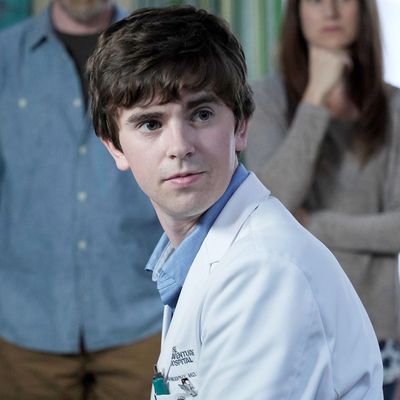
The guiding principle of The Good Doctor is summarized right there in its title. This is an ABC drama about a promising young surgeon who wants to make a positive impact and should be celebrated — and probably will be in every episode, if the pilot is any indication — for his extraordinary capacity to perform medical miracles.
In fact, less than ten minutes into the first episode, which airs tonight at 10 on ABC, Dr. Shaun Murphy (Freddie Highmore) is already performing one of those miracles, using his borderline telekinetic ability to diagnose and treat a boy suffering from a serious accidental injury in the San Jose airport. The first half of the episode, the only one ABC made available in advance, toggles between those suspenseful moments, as Shaun attempts to bring breath back into the child’s lungs, and a board meeting at St. Bonaventure Hospital, where Shaun’s mentor, Dr. Aaron Glassman (Richard Schiff), is arguing that Shaun should be brought on staff despite the fact that he is autistic. The initial portion of the hour also sprinkles in some flashbacks to Shaun’s childhood, as well as scenes involving other members of the St. Bonaventure staff, who mix business with pleasure to a degree that suggests they may have stumbled over to The Good Doctor after a stint on Grey’s Anatomy.
Every time the action cuts away from the dire situation Shaun is dealing with, all the tension in the episode gets punctured, which speaks to an overall tendency on The Good Doctor to soften every conceivable edge. There’s a lot going on here; too much, really. Like so many TV pilots, this one is auditioning for our attention and trying to cram every key character, theme, and backstory into that first tryout. It’s possible that once the show settles in, it could improve. It certainly has some factors that, at least theoretically, should work in its favor.
The Good Doctor comes from executive producer and writer David Shore, who created Fox’s House, a medical drama centered around a lead character who was nothing but edges. Its two leads, Highmore and Schiff, are both excellent and manage to make some very heavy-handed dialogue sound less didactic than it otherwise might. (“He sees things and analyzes things in ways that are just remarkable, in ways that we can’t even begin to understand,” Schiff says of Shaun. This is not the last time the actor will remind us that The West Wing provided excellent training for grounding overly earnest moments.) Seth Gordon — executive producer and a director of Netflix’s Atypical, another recent series about an autistic protagonist — directed The Good Doctor’s pilot, which is why some of the visual cues that convey autistic sensory overload may feel a tad familiar.
The Good Doctor is one of multiple new or recent shows centered around young men on the spectrum. In addition to Atypical, the best of the lot so far, there is also Young Sheldon, the Big Bang Theory prequel that, like The Good Doctor, emphasizes the magnificence of its young hero’s mind but, unlike The Good Doctor and in keeping with Big Bang’s approach, never outright discusses his condition.
The ABC series, like Dr. Glassman, is very open about Shaun’s autism and the fact that he has savant syndrome. But it’s mostly on a mission to prove that he is capable of doing extraordinary things, able to express compassion, and, most important from the show’s perspective, deserving of the audience’s empathy. Basically, Shaun is a superhero, right down to the X-ray vision and the extremely tragic childhood that made him realize he had a calling to help others in need.
There is nothing wrong at all with making a show about an autistic character that emphasizes his skills and talents, but, as with any lead on any drama, he should also have what every person has: some flaws. While The Good Doctor doesn’t shy away from presenting Shaun’s difficulties with communication and social norms, it tends to spin those qualities into a positive. When he says things in an overly blunt fashion — like telling a superior that he is very arrogant, then asking, “Does that make you a better surgeon? Does that hurt you as a person?” — it frames this as honest, laudable truth-telling rather than an ill-advised comment.
Shaun exists not only to make patients better, but, apparently, to make everyone around him a better person. There’s not a lot of nuance in that. Hopefully The Good Doctor will find some more of it in the episodes ahead. If it doesn’t, all the over-the-top sentimentality is going to make viewers feel sick pretty quickly.


